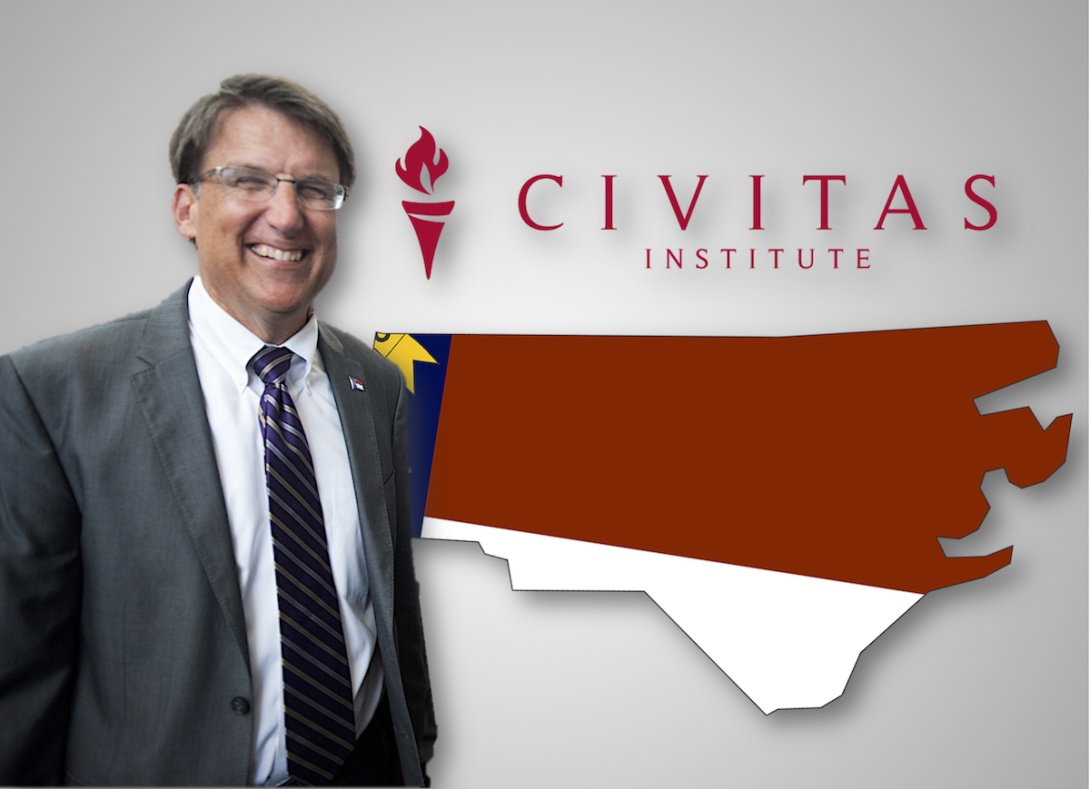Conservative group's lawsuit sets off eleventh-hour scramble in N.C. governor's race

A think tank founded and largely funded by GOP mega-donor Art Pope has jumped into the still-unsettled North Carolina gubernatorial race with a lawsuit challenging same-day registration — a program the legislature killed in 2013 but a federal court revived for this year's election. (Image of Pat McCrory is modified from a N.C. Department of Transportation photo.)
It's been three weeks since Election Day and North Carolinians still don't know officially who their next governor will be.
In that time, Democratic challenger Roy Cooper's lead has doubled and numerous county-level voter challenges filed by the campaign of incumbent Gov. Pat McCrory and other Republicans have been rebuffed by the state's GOP-controlled county elections boards. In some cases, the McCrory campaign falsely accused voters of being felons, incorrectly claimed voters cast ballots in multiple states, and lodged erroneous fraud claims against voters who died after casting early ballots.
This week the N.C. State Board of Elections instructed counties to dismiss McCrory's protests, though it did grant his request for a countywide recount of early votes as well as a recount of Election Day votes in one Durham County precinct. The recount is required to be completed on Dec. 5. Cooper currently has a lead of 10,263 votes, just over the 10,000-vote cutoff for a statewide recount, which McCrory requested before many counties had certified their results.
But there's another twist in the saga that could help McCrory: a federal lawsuit filed by the conservative John W. Pope Civitas Institute challenging the more than 90,000 votes cast by residents who registered and voted on the same day. The group also filed a protest on those same grounds with the N.C. State Board of Elections. Civitas was founded and is largely funded by Art Pope, a GOP mega-donor who served as McCrory's state budget director during the administration's first two years.
Same-day registration (SDR) in North Carolina, which the legislature adopted in 2007 after a long campaign by voting rights advocates, allows residents to register and vote on the same day during the early voting period, which in this year's general election lasted from Oct. 20 through Nov. 5. Voting rights groups embrace SDR because it increases voter turnout, remedies inaccurate voter rolls and helps geographically mobile lower-income citizens, young voters and voters of color.
Under North Carolina's program, county elections boards are required to send an address verification card to same-day registrants. If the card is returned as undeliverable, and a second one as well, the vote is supposed to be discarded. Civitas cites an N.C. State Board of Elections analysis of the 2012 election that found a higher percentage of same-day registrants failed the mail verification test than those who registered prior to voting, concluding this may indicate voter fraud.
But as Bob Hall of the elections watchdog group Democracy North Carolina told the Charlotte Observer, counties often send the cards weeks or even months late, and same-day registrants may move in the interim. Young voters, many of them students, use early voting at a disproportionately high rate and are typically the most transient residents. Moreover, the same 2012 elections board review cited by Civitas in challenging SDR found that the verification failure rate during a period when no early voting took place was actually higher than that for same-day registrants.
"It's primarily a propaganda campaign to attack same-day registration and lay the groundwork for legislators who want to change or repeal it in 2017," said voting rights watchdog Bob Hall.
Hall says SDR is "just as reliable if not more reliable than the regular registration process."
It's worth noting that registered Republicans used SDR disproportionately this year. Hall reports that while Republicans make up 30 percent of voters in North Carolina, they accounted for 34 percent of voters who used SDR.
"In 2016, it actually helped white Trump supporters who were energized, new voters," Hall told Facing South.
Civitas wants the more than 90,000 SDR ballots removed from the statewide count in the governor's race until all counties have verified the voters' addresses. The group estimates that 3,000 of these ballots will be thrown out. But even if that estimate is correct and all of those ballots were cast for Cooper, McCrory would still trail by roughly 7,000 votes.
Civitas President Francis De Luca has said that neither the McCrory campaign nor the state Republican Party were involved in the Civitas lawsuit. However, N.C. Republican Party Executive Director Dallas Woodhouse, who earlier urged county elections boards to curtail early voting, has also called SDR votes into question. In addition, both lawyers hired by Civitas to bring the lawsuit have close connections to McCrory, WRAL reports.
Hall said the McCrory team, Civitas and Woodhouse have "an elitist perspective on elections" that hearkens back to the pre-Civil War era.
"If they can no longer require property ownership as a prerequisite, then they'd like to require documentation that favors voters with long-term residency, plus identification attached to property, such as a Department of Motor Vehicles license," he told Facing South.
Meanwhile, McCrory rejected three lawyers from the prominent Brooks Pierce law firm that the state elections board wanted to hire to represent it in the Civitas lawsuit. Though McCrory did not explain why, many observers suspect it's because a partner in the firm co-chairs Cooper's transition team. Because of McCrory's action, a hearing on the lawsuit that was set to take place on Dec. 2 was moved to Dec. 8.
Another last-ditch hope for McCrory is a North Carolina statute that allows the legislature to name a winner in a contested election. The General Assembly did just that in 2004 when it was under Democratic control and decided a close race for state superintendent of public instruction.
Hall suspects the Civitas lawsuit is part of a plan to press for election law changes next year. "It's primarily a propaganda campaign to attack same-day registration and lay the groundwork for legislators who want to change or repeal it in 2017," he said. The McCrory campaign's numerous voter fraud claims, though largely erroneous, could provide the legislature with additional reason to revisit voting laws.
Tags
Alex Kotch
Alex is an investigative journalist based in Brooklyn, New York, and a reporter for the money-in-politics website Sludge. He was on staff at the Institute for Southern Studies from 2014 to 2016. Additional stories of Alex's have appeared in the International Business Times, The Nation and Vice.com.
